1964 - 1971
The beginnings
1964
Jean-Claude Decaux invents the new concept and business model of Street Furniture with bus shelters financed by advertising. JCDecaux is born, and also a brand new 2m2 advertising format.
Lyon (France) will be the first city to adopt JCDecaux's business model.

1971
JCDecaux installs its street furniture in Lisbon. JCDecaux Portugal becomes the first subsidiary in a non-French-speaking country.

1966
2 years after its creation, JCDecaux expands out of France, and installs its bus shelters in Brussels (Belgium), where is created the first subsidiary.

1967
The firm establishes its headquarters in Plaisir, near Paris. 50 years later in 2014, the site welcomed over 700 employees of more than 100 professions, from the poster preparation to the R&D.
1972 - 1981
Innovations for brands and cities
1972
JCDecaux revolutionizes the advertising panels by replacing all the sheet metals by back-lit panels.
The advertisement becomes more colourful and luminous, able to render the finest details of photographs, which were just beginning to be used in advertising.

1972
Wishing to beautify its growing urban environment and to provide more services to the general public, Paris adopts in 1972 JCDecaux's bus shelters.

1975
JCDecaux designs new signposts and offers them to cities together with its bus shelters and City Information Panels. The French government would make them the standard for all signage in France.

1980
Designed to be perfectly clean and operational and already energy and water saving, JCDecaux's automatic public toilets are first tested and then installed in Paris in 1980 and 1981.

1972
JCDecaux invents the City Information Panel, a street furniture displaying city information on one side and advertising on the other. A new division is formed 3 years later to help cities create their maps and communications.

1973
JCDecaux introduces the seven-day campaign, which offers more flexibility and impact to advertisers.

1976
A new model of Street Furniture, the "PISA", is invented to combine on the same side city information and advertisement. JCDecaux invents at the same time the 8 m². This format will outlive the "PISA" replaced from 1988 by the "Senior".

1980
JCDecaux invents the Electronic Information Board. Cities can now communicate their messages in real time to their citizens, 24/7.
1982 - 1998
Design and Business Development
1982
JCDecaux installs its first furniture in Germany in Hamburg in 1982. In 1990, a few months before the reunification, JCDecaux would be one of the first companies to invest in Eastern Germany, with a contract with the city of Leipzig.

1992
Sir Norman Foster is the first designer to work with JCDecaux to design of street furniture lines. Over 50 designers would work with JCDecaux, Mario Bellini, Philippe Starck or Jean-Michel Wilmotte among them.
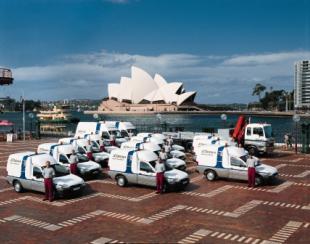
1997
Thanks to its close collaboration with the designer Philip Cox and to the quality of its maintenance, JCDecaux wins the tender for the City of Sydney. The Group enters Oceania.

1982
The JCDecaux teams designs the Murano bus shelter.

1991
JCDecaux acquires the Morris Columns.

1994
San Francisco is the first American city to partner with JCDecaux, who installs its first model of automatic public toilets accessible to people in wheelchairs.
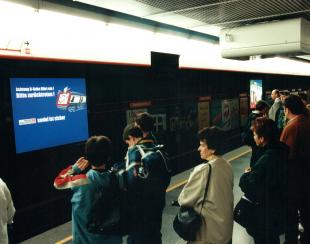
1998
Infoscreen installs in 1998 the Group's first digital displays in the metro of Vienna.
1999 - 2012
From challenger to number 1 worldwide
1999
JCDecaux wins the first advertising concession in Singapore which used to forbid advertising in public spaces, and installs bus shelters on Orchard Road.

2001
JCDecaux becomes listed at the Paris stock exchange. In anticipation, the Group has set up the year before what is still today's governance: a supervisory board, and an executive board with a rotating annual chair held alternately by Jean-François and Jean-Charles Decaux.

2004
JCDecaux UK starts to challenge the conventions of outdoor advertising, and spices traditional campaigns up with bespoke out of the box elements. In 2004, JCDecaux Innovate is officially created.

1999
JCDecaux buys Avenir, the outdoor communication division of Havas Media Communication. The group welcomes the two new activities of Large Format and Transport Advertising.

2003
A new service joins the JCDecaux portfolio, to answer cities' needs for better urban mobility. The first self-service bicycles scheme is installed in Vienna, Austria.

2008
JCDecaux signs in 2008 its first contract with Dubai International Airport. Other deals in the region would follow, and JCDecaux Middle East will grow to over 250 employees in 2014.

2011
Then present in 56 countries, JCDecaux becomes #1 worldwide in outdoor adverting.
2013 - 2019
Developing interactivity and connectivity
2013
In 2013, JCDecaux buys 85% of Eumex, a Mexican company founded in 1995. Over 500 people join JCDecaux who strengthens its position in Chile and Argentina, and makes its entry into seven new countries.

2014
JCDecaux puts its networks at the service of urban connectivity by partnering for small cells deployment with Vodafone, Huawei or Alcatel-Lucent. Amsterdam is the first city to equip over 400 bus shelters.

2014
JCDecaux acquires Continental Outdoor Media. With a presence in 16 countries, JCDecaux becomes the number one outdoor advertising company in Africa.

2016
17 years after its arrival in Japan, where outdoor advertising was not allowed in the public domain until 2003, JCDecaux strengthens its presence in the world’s third-largest advertising market by winning the contract for street furniture advertising in Tokyo, the last iconic megacity that was missing from the Group’s list of achievements.
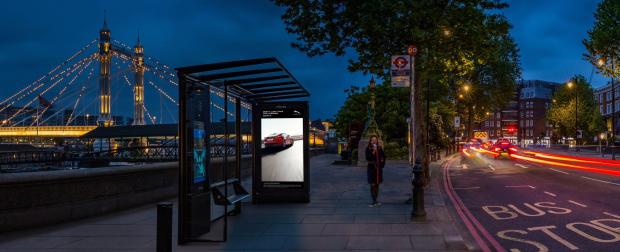
2017
London becomes JCDecaux's digital showcase with the world’s largest network of digital bus shelters. 1,000 84-inch digital screens with unparalleled picture quality offer advertisers a premium audience across the capital, including the City, where bus shelter advertising was previously banned.

2018
JCDecaux is at the forefront of the self-service bike rental market with its roll-out of 4,000 new Vélo'v bikes in Lyon in one night. In the Nantes urban area, the Group’s 1,230 biclooPlus is a comprehensive offer, with bikes for medium and long-term rental and a parking solution. And self-service vel'oH bikes with inbuilt electric assistance are rolled out in Luxembourg.
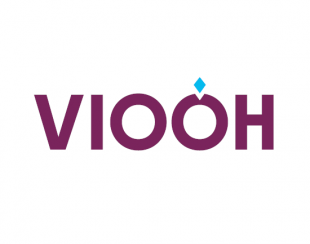
2018
Launch of VIOOH, an independent and automated global planning and trading platform designed to connect media buyers and agencies to the digital programmatic ecosystem. Through the use of algorithms, VIOOH allows them to more easily access intelligent solutions that can be automatically adapted to the target audiences.

2019
23 years after the launch of our advertising street furniture concept in the US, JCDecaux strengthens its partnership with the City of San Francisco with a 20-year contract including design, installation and daily maintenance of three-sided columns as well as fully accessible automatic public toilets.

2019
JCDecaux becomes the first Out-of-Home Media company to join the RE100 initiative, a global leadership initiative for companies committed to 100% renewable electricity.

2013
A new division, JCDecauxLive, is created at JCDecaux UK, aiming at delivering more interactive and engaging campaigns. This new experiential division activates the full potential of the latest digital screens.

2013
JCDecaux begins creating bespoke digital screens: Waterloo Station (UK), Chicago, Los Angeles Airport (LAX)

2015
Smarter and greener bus shelters arrive in the cities, beginning with Paris new bus shelter equipped with photovoltaic panels, green roofs, USB chargers and digital information screens providing real-time and localised information.

2016
Intelligent street furniture, connectivity, mobility, interactive, service-oriented and contextualised communication; JCDecaux is a pioneer in smart cities. The Group offers free broadband Wi-Fi on the Champs-Elysées in Paris and intelligent street furniture, a real cluster of innovation, in Nice and in an increasing number of cities.

2017
Chicago becomes the first American city to allow video content on digital street furniture. JCDecaux installs 150 86-inch screens at premium locations in the city’s business centre, including the Loop financial district and the iconic North Michigan Avenue, one of Chicago’s main tourist attractions.

2018
The takeover of APN Outdoor in Australia is the largest transaction since JCDecaux’s initial public offering in 2001. The acquisition paves the way for a significant expansion of the Group’s business in Australia, the world’s 7th largest advertising market, and one that is particularly receptive to digital outdoor advertising. It also allows JCDecaux to gain a foothold in New Zealand.

2018
JCDecaux sets up a Data Division at Corporate level inaugurating a new phase in the transformation and development of its business.

2019
JCDecaux announces it has been awarded an 8-year services concession contract by the City of Paris for columns and display flagpoles. They are used to advertise entertainment and promote social and cultural events. As an intrinsic part of the Paris urban landscape, columns and display flagpoles are an important way to promote cultural life. Their design pays homage to Paris’ heritage while also looking to the future.
2020 - onwards
An ever more sustainable media
2020
JCDecaux France acquires Abri Services Media, street furniture specialist in the France’s Grand-Ouest region. This merger strengthens JCDecaux's territorial coverage in France. It also enables JCDecaux to provide even better solutions to meet the service needs of cities and citizens, and particularly regional and local advertisers, who now more than ever are seeking out sustainable, effective, and impactful local communication.

2021
JCDecaux launches JCDecaux Data Solutions, a portfolio of global and local data-driven solutions that enables advertisers to maximise the power and ROI of their media investment. By developping and globalising its product offering through optimised campaigns using data and technology, the Group accelerates its transformation and delivers increasingly impactful solutions.

2022
The City of Paris renews its trust in JCDecaux for its future automated public toilets with the most innovative, efficient and high-capacity facilities in the world. The toilets will be particularly sustainable as water consumption will be cut by almost 2/3 and electricity consumption by 1/3 compared to the current position.

2022
JCDecaux acquires Pisoni, a French player in street furniture and outdoor advertising in the south of France. Thanks to this acquisition, JCDecaux is strengthening its presence in the Mediterranean basin.

2023
JCDecaux announces that it has signed a global strategic partnership with the United Nations Development Programme (UNDP) to support the “UN Joint Sustainable Development Goals Fund” (Joint SDG Fund), a Fund devised to stimulate the development of Sustainable Development Goals (SDGs) worldwide.

2024
In 1964, we installed our very first advertising bus shelter in Lyon, France. The invention of our founder Jean-Claude Decaux pays off and transforms into a business model, allowing JCDecaux to offer local authorities and citizens free bus shelters financed by the advertising displayed on them.
Discover the key innovations that have helped transform our cities and public spaces.

2021
In La Madeleine (Métropole Européenne de Lille) and Strasbourg, JCDecaux deploys its Filtreo® bus shelter, a new-generation bus shelter designed by JCDecaux's R&D teams. Its green roof and ventilation system help to improve air quality for passengers.

2021
True to its pioneering vision of sustainability and societal challenges, JCDecaux launches the first environmental, economic and social footprint calculator for campaigns in France : Empreinte 360 (360 Footprint). It provides fully transparent information to advertisers on the impact of JCDecaux campaigns.

2022
JCDecaux unveils its new strategic ESG roadmap for 2030, towards more sustainable living spaces, an optimsed environmental footprint and a responsible business environment. This aims to support the circular economy, promote outdoor advertising as a catalyst for ecological and social transition and work towards the decarbonisation of the economy and society.

2022
JCDecaux announces the registration of JCDecaux SA as a European Company. This new legal status reinforces the European dimension of a global Group for all its stakeholders.

2023
JCDecaux unveils its Climate Strategy which is based on three principles: Measure, Reduce, Contribute. It aims for Net Zero Carbon by 2050 (scopes 1, 2, and 3). This initiative reaffirms the JCDecaux Group's commitment to an active participation in the fight against climate change by adopting eco-responsible practices and promoting sustainable innovation in its business practices.

2023
The United Nations Secretary-General's Special Envoy for Road Safety, Mr Jean Todt, and Jean-Charles Decaux, co-CEO of JCDecaux, launches a new UN Global Road Safety campaign to address road traffic crashes, which are the leading cause of death for people aged 5 to 29 around the world. Over the next two years, the campaign, translated into 30 languages, will appear on billboards and in public areas in 80 countries worldwide thanks to a global partnership with JCDecaux.
